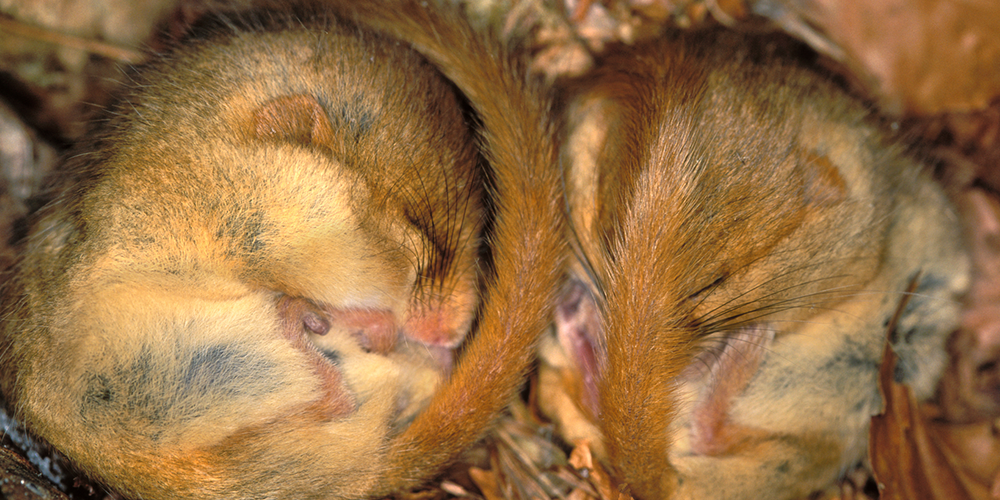Why We Sometimes Feel Like Hibernating in Winter

Many of us feel sleepier in Winter and wonder why we find it especially difficult to get up on those colder, dark mornings. We might even joke about hibernating! Of course, this is very different from some animals, who really do hibernate to help them survive until things warm up.
So, before looking at the reason why we, as humans, feel sleepier in the Winter, we thought we’d share some interesting facts about hibernation amongst some of our animal friends around the world.
What is hibernation?
Hibernation is a way for many animals to survive cold winters without having to forage for food or migrate to somewhere warmer. Instead, they try to fatten up as much as they can during the warmer months and then find a cosy place to make a nice comfy bed. Sleeping all Winter can make smaller animals vulnerable to predators, so they seek out somewhere that is tucked away and is a good hiding place. They then go to sleep, turning down their metabolism to save energy and making their stored fat last as long as possible.
Some animals, such as hummingbirds that live in the Andes, don’t go into full hibernation but go into a state of suspended animation, known as Torpor. This usually lasts less than a day when their breathing, heartbeat and body temperature are reduced. This conserves energy in the short term and can help them to survive a brief bout of poor conditions, such as cold nights. Those species of bats that do not go into full hibernation or migrate to warmer areas, will also go into ‘torpor’.
Bears go through a light form of dormancy, where they are groggy but easily roused. Having spent several months on building up their fat reserves, they find a suitable den and sleep as much as possible. A bear’s body temperature will drop only a few degrees, but it will lose up to 40% of its body weight over winter. Female bears can give birth and suckle their cubs during this state. Polar bears build dens in the snow and female bears will mostly give birth in December, emerging with their young in Spring.
Do any animals hibernate in the UK?
Three types of mammals in Britain are true hibernators – dormice, hedgehogs and bats. Some insects in the UK also have a form of hibernation, called ‘diapause’ and British amphibians go into a largely dormant state, hiding in holes, log piles or compost heaps. Badgers enter into a state known as ‘winter lethargy’, where they spend most of their time underground but are awake and fairly active. Contrary to popular belief, squirrels are not only active throughout the Winter, but they also breed in January.
Buzzzz or Zzzzzzzzz?
If you’ve ever wondered where bees go in the Winter, then this varies depending on the type of bee! Honeybees don’t hibernate but spend most of their time during the winter clustered together in their hive to generate heat and keep warm. The cluster is about the size of a football and the bees take turns in being on the outside of the cluster. Some species of British bumblebees are still busy during the colder months, especially in the more urban areas, whilst other species hibernate. Hibernating bumblebees are all potential queen bees, which will go on to make nests in the Spring. You might uncover a hibernating bumblebee whilst gardening in Winter or early Spring, so try not to disturb her and make sure you gently cover her up again as loosely as possible so she can dig her way out when it is time to do so.
So why does winter make us sleepier?
When it comes to us, we tend to feel sleepier in the winter because we have longer periods of darkness. These reduced hours of daylight affect our circadian rhythm and makes our bodies produce more of the ‘sleep hormone’, melatonin. This makes us drowsy when we need to get up in the mornings! Circadian rhythms are physical, mental, and behavioural changes that follow a 24-hour cycle. These natural processes respond primarily to light and dark and affect most living things, including us. Less exposure to sunshine also means we produce less Vitamin D, and this can impact on our sleep as well as our immune function. This can be helped by taking vitamin supplements but always check with your doctor or seek medical advice.
No matter what the season, we all need to make sure that the sleep we get is quality sleep -and a good place to start is with bedding that creates the best sleep environment for you. You want your bed to feel like an inviting place to tuck up for the night! Wool filled bedding is breathable and therefore temperature regulating, unlike synthetic alternatives. It helps to keep your core body temperature balanced whilst you sleep, and also works with the ambient temperature of your bedroom. Wool is also naturally resistant to dust mites and the build-up of micro bacteria and that makes is more hygienic than many other duvet fillings. That adds up to a great night’s sleep and may tempt you, not to hibernate, but at least have a bit of a lie in!
All our 100% British wool duvets, toppers and pillows are made with responsibly sourced, 100% natural, sustainable materials and are chemical free. Each one is individually handcrafted by our wonderful seamstresses, here at our Devon workshops on the edge of Dartmoor.
If you have any questions about our products, then do get in touch and the team will be happy to help.


